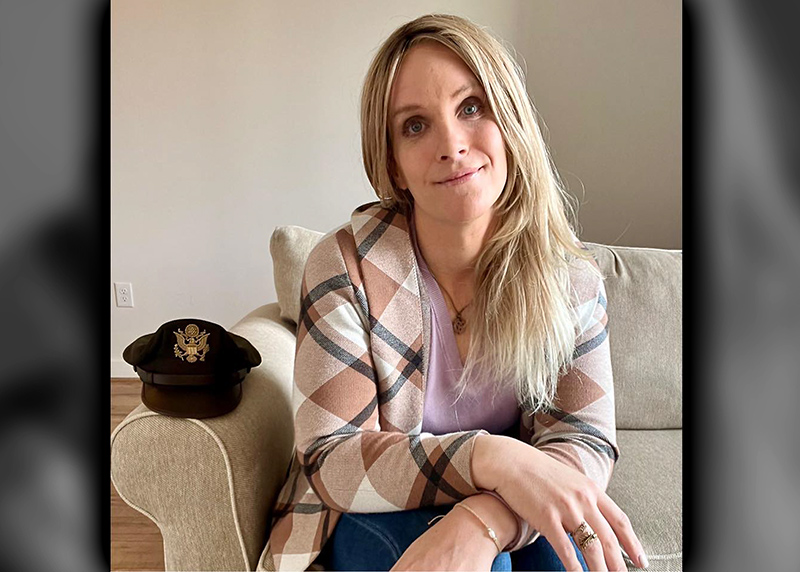The Trans Community Takes a Stand at the Supreme Court
Amid a bleak political environment, trans people and allies rallied at the Supreme Court, demanding an end to bans on gender-affirming care.

Several hundred transgender people and allies rallied outside the U.S. Supreme Court building on Wednesday, December 4, while the high court’s nine justices heard oral arguments on whether to overturn a Tennessee law banning transgender minors from receiving gender-affirming health care treatments.
U.S. v. Skrmetti reaches the court at a time when fear and uncertainty are widespread among members of the transgender community due to Donald Trump’s victory in the presidential race, Republicans winning control of both chambers of Congress, and a spate of laws restricting access to gender-affirming care that have been approved by Republican-led legislatures over the past three years.
Currently, 23 states besides Tennessee prohibit doctors from prescribing puberty blockers or hormones to transgender minors, as well as surgical care. Two states — Arizona and New Hampshire — prohibit only surgical interventions on minors suffering from gender dysphoria.
More troublingly for transgender individuals and advocates, President-elect Trump has promised to ban doctors from prescribing transition-related treatments to minors, and U.S. Rep. Marjorie Taylor Greene (R-Ga.) and her ideological allies in Congress have introduced a bill that would criminalize and jail providers who do make such recommendations.
Against this backdrop of a bleak political environment, and despite a looming sense of dread felt by many within the trans community, pro-transgender demonstrators flooded the left half of the area in front of the steps of the Supreme Court, with the crowd spilling onto the public sidewalk and stretching across First Street.
Meanwhile, a dueling rally on the court’s right side, held by proponents of the ban, drew only a few dozen participants.
For nearly four hours, the pro-trans demonstrators cheered on speakers and led chants calling for overturning bans on gender-affirming care.
Several speakers noted that Chase Strangio, a transgender man who serves as co-director of the American Civil Liberties Union’s LGBTQ & HIV Project, which is representing the plaintiffs in the Tennessee case, was making history as the first out transgender lawyer to ever argue a case before the high court.
Calling himself a “proud trans man,” actor Elliot Page spoke of the importance of dispelling myths and outright falsehoods surrounding transgender identity and transition-related care.
“No matter how much I publicly speak about my life being transformed for the better because of gender-affirming medical care, too many people ignore my words and instead project their fears onto my self-love,” Page said. “What is it about our joy that makes people so uncomfortable? They debate the legitimacy of the health care that allows us to thrive. But is this really about health care? … I think we all know that they want to ban this care, not because it doesn’t work, but because it does.”

The outcome of the case — which will likely be issued in late spring — has the potential to impact the availability of care for all transgender people — not just minors — nationwide.
If the high court upholds Tennessee’s ban, other state legislatures that haven’t yet passed bans will either be encouraged to follow suit or will be pressured by activists to severely restrict access.
Some states with bans for minors may also take an affirmative decision in favor of upholding the Tennessee law as a “green light” to push other laws or regulations severely limiting access for adults.
Jace Woodrum, executive director of the ACLU of South Carolina, said that is exactly what has happened in his home state.
“Two of our state’s largest health care providers have stopped providing care to transgender adults,” he told me. “The bill that passed in South Carolina prohibits public funding from being used for gender-affirming care. And health care providers in the state all receive some amount of government funding. So rather than courageously dividing up their money [to distinguish between public funds and other sources of funding], they are choosing to give into political pressure and cut off care.”
The heart of the challenge to the Tennessee ban on gender-affirming care, said Woodrum, is an issue of equal protection under law and whether the ban constitutes sex discrimination based on a person’s assigned sex at birth.
“Hormone therapy includes puberty blockers, estrogen, and testosterone,” he said. “Those are treatments that are provided to kids who are not transgender…. But the law specifically bans those same treatments for kids who are transgender. And we argue that it is not constitutional to prohibit treatment specifically for people who are transgender. That is equivalent to sex discrimination.”
Woodrum fears that a refusal to curtail the Tennessee ban will only embolden those who believe no transgender person should have their gender identity recognized as valid or affirmed in any way.
“I think the attacks and the political rhetoric have gotten to a really shockingly dangerous place,” he said. “President-elect Trump spent $65 million on anti-transgender ads. South Carolina Congresswoman Nancy Mace doesn’t want transgender people to come into the Capitol, including her own colleagues. And we have half the states banning health care.
“Unless the court sends a very strong message that treating transgender people differently is unconstitutional, we will see increased attacks. And those attacks will impact adults.”
Mothasistah, an activist and mother of four, including a transgender child, stressed to me that it is important to stand up against efforts to restrict transgender health care and deny transgender existence.
“This is almost surreal, because how do you say that some children can get affirming care, but others cannot,” she said. “Affirming care was not invented by the trans community. Cisgender, heterosexual people have always had affirming care. So clearly, you are doing something to hurt children that you don’t agree with.”
Jen M., a St. Louis-area mother of an adult transgender son, came to Washington, D.C., to support other parents and families of transgender youth who are fearful of the impacts of gender-affirming care bans. She told me that her son came out as trans at age seven and was able to receive gender-affirming care starting at 11, long before Missouri’s own ban was proposed.
“I’m a mother of a transgender adult that benefited from puberty blockers and gender-affirming care,” she said. “He’s thriving. He’s had no ill effects. He’s a very successful young adult. He’s contributing to society. He’s on track to go to medical school.
“Anybody who thinks that gender-affirming care is dangerous, they need to do the research. It’s no more dangerous than putting your kid under anesthesia to have their wisdom teeth removed.”
Jen, whose husband served in the military, worries that expected crackdowns on coverage for gender-affirming care for transgender service members and the dependents of service members may affect her child. For now, her son is insured and receives treatments through TRICARE, but the incoming administration seems intent on prohibiting the insurance program from covering transition-related health care.
“[Gender-affirming care] should be accessible by every transgender human being in the United States and on the face of the planet,” she said. “And what’s happening right now is politicians have put fear into families. It’s unfair, and it’s very un-American.”
Following oral arguments, Strangio emerged from the Supreme Court building and descended the front steps. The crowd on the pro-transgender side erupted in raucous cheers.
Strangio appeared to briefly tear up but steadied himself. He urged people to continue fighting for transgender rights, even if there is a setback in the courts. And he appeared to allude to the fact that much of the mainstream media coverage of the oral arguments indicates that the 6-3 conservative majority seems poised to uphold the Tennessee ban.
“Whatever happens, we are, collectively, a refutation of everything they say about us,” Strangio said to the crowd. “The fight for justice did not begin today. It will not end in June or whenever the court decides. I know that the months ahead and the years ahead are terrifying. I know that we have been the subject of relentless and unjustified attacks. But we’re in it together.”
Before departing, Strangio, his voice audibly cracking, told the assembled, “I love being trans. I love being with you. And we’re going to take care of each other.”
Get the latest LGBTQ news in your inbox. Subscribe to our free magazine and newsletter.
Support Metro Weekly’s Journalism
These are challenging times for news organizations. And yet it’s crucial we stay active and provide vital resources and information to both our local readers and the world. So won’t you please take a moment and consider supporting Metro Weekly with a membership? For as little as $5 a month, you can help ensure Metro Weekly magazine and MetroWeekly.com remain free, viable resources as we provide the best, most diverse, culturally-resonant LGBTQ coverage in both the D.C. region and around the world. Memberships come with exclusive perks and discounts, your own personal digital delivery of each week’s magazine (and an archive), access to our Member's Lounge when it launches this fall, and exclusive members-only items like Metro Weekly Membership Mugs and Tote Bags! Check out all our membership levels here and please join us today!


























You must be logged in to post a comment.